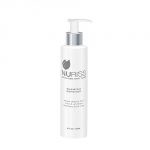Simple Tips for Acne Sufferers
Adult acne can affect not only your skin, but your self-esteem. Acne can prevent you from feeling your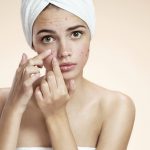 self and even from going out. According the International Dermal Institute, over 55 percent of the adult population suffer with low grade acne. Adult acne usually occurs between the age of 20 to 40, when you think that you have finally gone through puberty and have come out the other side unscathed, then bam… adult acne comes along and bites you, quite literally in the face. Even though it can sometimes occur in males, the majority of cases occur in females. Don’t be dismayed ladies, there are many simple tips which can help prevent adult acne and reduce it, if you already have it.
self and even from going out. According the International Dermal Institute, over 55 percent of the adult population suffer with low grade acne. Adult acne usually occurs between the age of 20 to 40, when you think that you have finally gone through puberty and have come out the other side unscathed, then bam… adult acne comes along and bites you, quite literally in the face. Even though it can sometimes occur in males, the majority of cases occur in females. Don’t be dismayed ladies, there are many simple tips which can help prevent adult acne and reduce it, if you already have it.
Finding out the cause of your acne:
There are many reasons why you may have acne, and without getting to the root of the problem, you may never know how to fix it. Here are some causes of acne;
It’s a family thing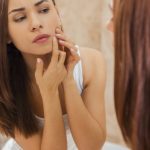
Unfortunately, genetics can play a huge part in whether or not you will have acne. If your parents had acne, there is an extremely high chance that you will have it sometime in your life.
Bacteria and blocked pores
As you go through puberty, your sebaceous glands in your skin begin to secrete sebum, which is an oily material. This oil is essential to keeping your skin healthy, however sometimes the oil does not come out of your pores as easily as it should and your pores become blocked. As the pores become blocked, this creates the perfect environment for P.acnes (a common bacteria) to flourish, which leads to spots and acne.
Hormones
It is thought that adult acne occurs during certain times in an adult women’s life due to hormone changes.
- Periods – Just before your menstrual cycles, there are changes in your hormones and th
 is can lead to a flare up of acne.
is can lead to a flare up of acne. - POS (polycystic ovary syndrome) – This is a common condition which causes small cysts to form on the ovaries. Unfortunately this syndrome can lead to weight gain, hair growth and acne.
- Pregnancy – During the first trimester of pregnancy, due to the hormone imbalance and sheer amount of pressure on your body, this can cause acne to rear its ugly head, however if you do not normally suffer with acne on a regular basis, then it is quite likely that your adult acne will disappear after your pregnancy.
Acne can also be triggered by the following:
Smoking
If you are a smoker then you are more likely to develop adult acne.
Cosmetics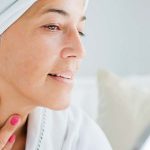
There are some cosmetics available which contain chemicals that can cause acne flare ups.
Regular wearing items
If you wear sweat bands or a backpack, you may find that the areas under these items may become irritated and therefore cause areas of acne.
Medication
Some medication can cause acne, these include; steroids, lithium and even some anti-epileptic drugs.
Choosing the Correct Acne Treatment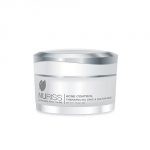
There are numerous ways to help treat your acne, it all depends on what is causing your acne. If your acne is severe, then it is definitely wise to seek the attention of a medical professional as they can recommend the best treatment for you. However, there are some simple treatments that can take place at home, for the individuals who suffer with slight to mild acne breakouts.
Your skin is the largest organ in your body and remember that it is there for a reason, to protect your body. By scrubbing your skin away, you may not necessarily be helping your acne.
Here are some top tips to help you if you are suffering with a flare up;
- Use a gentle, natural soap – some soaps can contain chemicals which can inflame your acne, so use
 a natural, chemical-free soap.
a natural, chemical-free soap. - Wash your skin gently, don’t scrub – try not to damage your skin when washing.
- Don’t use your hands – when washing your face, do not use your hands as they have oil on them which can be transferred onto your face.
- Use a low percentage Benzoyl Peroxide Solution – This can help dry out your spots and prevent more from occurring.
- When using treatment, treat your entire face – Do not just treat your spots, ensure that you treat your whole face as spots can still be present under your skin, without becoming visible just yet.
- Moisturise regularly – even though you may have acne, it may not mean that you have excess oil on your skin. Some individuals who suffer with acne, in fact have very dry skin, so moisturising regularly can help to keep the skin full of moisture and supple. If in fact you do have oily skin, you can use a non-clogging moisture which is water based to help keep your skin nourished, without clogging your pores.

- Use gentle exfoliation creams – It is important when exfoliating your skin that you do not overdo it and damage your skin further. Just a gentle scrub will help to clean out the blocked pores and keep your skin rejuvenated and healthy. Using a scrub such as the ‘Nuriss Blemish Defense Exfoliator’ “can be extremely effective in re-texturing your skin, removing the dead skin cells, oil, debris and also unblocks your pores” says our very own Dr Anita.
- Don’t pick your spots – I know it is a hard task, however picking your spots can be extremely detrimental to your skin and can even cause scarring, which is even harder to get rid of.
- Always wear adequate sun protection on the areas where acne is most prominent – Some individuals feel that the sun sometimes can help to reduce the appearance of acne, however this is not always the case. In addition, sun rays can cause other skin issues which include; premature aging as well as skin cancer, so using a high factor sun lotion is essential to the happiness of your skin.
If you are really struggling with your acne, speak to your health care professional who can prescribe medication and help you on your way to having acne free skin.

 is can lead to a flare up of acne.
is can lead to a flare up of acne. 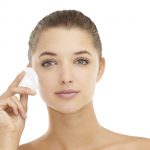 a natural, chemical-free soap.
a natural, chemical-free soap.